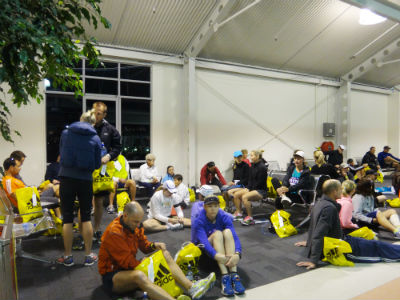Last Saturday, I attended a talk organized by the Standard Chartered Marathon Singapore team to prepare runners for the race next month. Top Singapore marathoner Anne Qi Hui and her coach, Ben Pulham, were there for a Question and Answer session. (Pulham is the co-founder of the Journey Fitness Company). Read on, for their running tips – in response to questions by the audience.
Could you give some tips on how to run a better race?
You need to get the most out of yourself in order to run a good race. You must execute well what you have – and maximize your fitness by executing a smart, patient race. You must be progressive and finish the race strongly. You can usually clock a better time at the finishing line by being patient and in control of yourself. Don’t go all out. And don’t worry about people running past you at the start. As you run more and train more, you’ll progressively get faster and gradually improve your own timing.
Anne, how hard do you usually train?
To be honest, I never think I train hard enough when I am by myself. I like running in my comfort zone but I think that I am being too relaxed when I run. So in order to improve myself, I need to run with people, especially with guys. I am usually slower than them but I improve because I work very hard chasing them. On average, I train about five to six days a week. Sometimes though, I may run twice a day.
How do you cope with pain at the 30-32km mark during marathon races?
When you “hit the wall” at about 30 to 32km, you’ll start to wonder why you ever signed up for the race and what you are actually doing there. Your pacing, energy and expectations will usually start to slow down. But it is important to push on after that point with a strong purpose – even though it is not fun. Try and refocus your mind when this happens. Think of positive experiences and previous times and races when you have felt good. Try to adapt and just keep on going. If you’re really tired, put one foot in front of the other, one step at a time – in order to complete the race. If you pace well throughout your run and employ the right pacing strategy, you should not really hit the wall or struggle so much. People usually hit the wall because they have run much too fast at the beginning and their speed is now catching up with them.
What do you do Anne, when you hit the wall during races?
Sometimes when I hit the wall, I do ask myself, why am I here? But I can’t stop to think about negative thoughts because it is a race. So I must clear my mind, because this is not a good thought. I must think positively.
Do not dwell on the negative thoughts, because one will be followed by another and another. Often I say that I am there to finish the race, not just to start. I will motivate myself until I feel better.
And if I run fast enough, I can get $10,000 (e.g. prize money for the Standard Chartered Marathon Singapore) so I just do it and keep on pushing myself until the very end!
If the weather conditions are too hot or too wet, how do you run on race day?
The weather is something that you can’t really control. We make it hard on ourselves by living in humid and sunny Singapore. You can’t really control the weather, so don’t give it much thought. There’s nothing you can do about it.
But try and adapt to the conditions come race day. If it rains, it’s no excuse to not continue running unless there’s severe lightning, and in which case, the race would probably be called off. Actually it might be good if there is a little bit of rain, because the rain cools you down, so you will be able to maintain a lower heart rate and a higher pace.
On the other hand, if the weather is very hot, you’ll need to adapt your race strategy, by starting the race even more slowly. During hot weather, fatigue can catch up with you quickly. You don’t need to adapt your nutritional strategy in terms of your food intake when it’s hot, but you can offset the heat by starting slower at the beginning. On hot days, you use more energy and your body is working harder to manage the heat.
Of course, adapting your race strategy to the weather is tricky because different people respond differently to challenges. Everyone will be suffering but you will suffer less if you manage yourself properly.
How can I prevent dehydration during races?
Everyone is different when it comes to nutrition and hydration. You need to do enough training sessions so that you will know what your limitations are and when, for example, to hydrate yourself during runs and races.
If you are not drinking enough water, it could manifest itself in the form of cramps, which you won’t want to experience on race day.
How can you train your body to sleep early before the race?
For a start, don’t take sleeping pills because they won’t help you. They may even make you sleep so soundly that you won’t even be able to wake up for the race!
It takes progress and strategy to train your body to sleep earlier than usual. Suddenly sleeping four hours earlier than usual is hard for the body. This is something that can be trained progressively though and it will happen over time.
For example, start by training your mind to sleep ten minutes earlier for the next few days, and then slowly work you way to 20 minutes earlier than your original bedtime, and so on.
How about you, Anne? What do you do to train your body to sleep?
For me, dinner is quite important so I eat at five in the evening and usually sleep at eight or nine o’clock at night. But sometimes if I have my iPad or iPhone with me, I’ll get distracted and won’t sleep till 11pm. So I can’t have any distractions.
During the day too, you can’t have so many assignments if you want an early night. Otherwise your heart rate will be too high and you cannot sleep. So just have a low-key day, eat and drink well, with not too much distractions.
Just try and make your sleeping patterns natural. It’s hard to sleep four hours earlier, because you just won’t be able to sleep. Waking up early though, is a good way to get yourself to sleep earlier because your body will feel more tired when night time comes.
The last thing that you should not do the night before a race is to stay up late watching a movie or trying something unfamiliar. I learnt that the hard way, by catching a movie last night, and I ended up thinking about it the entire night! And it’s still stuck in my head!
Listen to calming music to help you sleep. It works wonders.
How much time do you spend on strength exercises?
I don’t really do strength exercises intentionally. I used to play hockey a lot, so I look muscular and I have a good foundation because of this.
I work as a personal trainer during the day and do demonstrations and strength training as part of my work, so this helps with my running too. As well, I do lots of hill repeats during training sessions that give me strength too – for my running.
All runners are different in terms of flexibility and structure and there is no one solution that can apply to everyone. Your flexibility as a runner depends on you. If you are generally stiffer in your running, you need more flexibility training but if your core muscles are weaker, then spend more time on strength training.
I don’t really believe in gym training – I prefer sports-specific training. For example, I prefer strength training through hill repeats, intervals and other endurance exercises – not so much of working out in the gym.
The returns of doing strength exercises like hill repeats and intervals are faster than going to the gym. A good chunk (80%) of your training schedule should focus on strength training as a runner. You can use your body weight for strength training. Body weight is the way to go. So try and find hills and then run up them. This is a simple way to run faster.
Get running tips from other experts:
- Pacing Tips from Top Male Marathoner Mok Ying Ren
- Recovery Tips from Top Male Marathoner Mok Ying Ren
- More General Tips from Top Male Marathoner Mok Ying Ren
- Useful Tips from Leading Singapore Marathoner Ashley Liew
- Tips From Sundown 100km Ultra Winner
- More Tips From Female Marathoner Anne Qi Hui




Leave a Comment